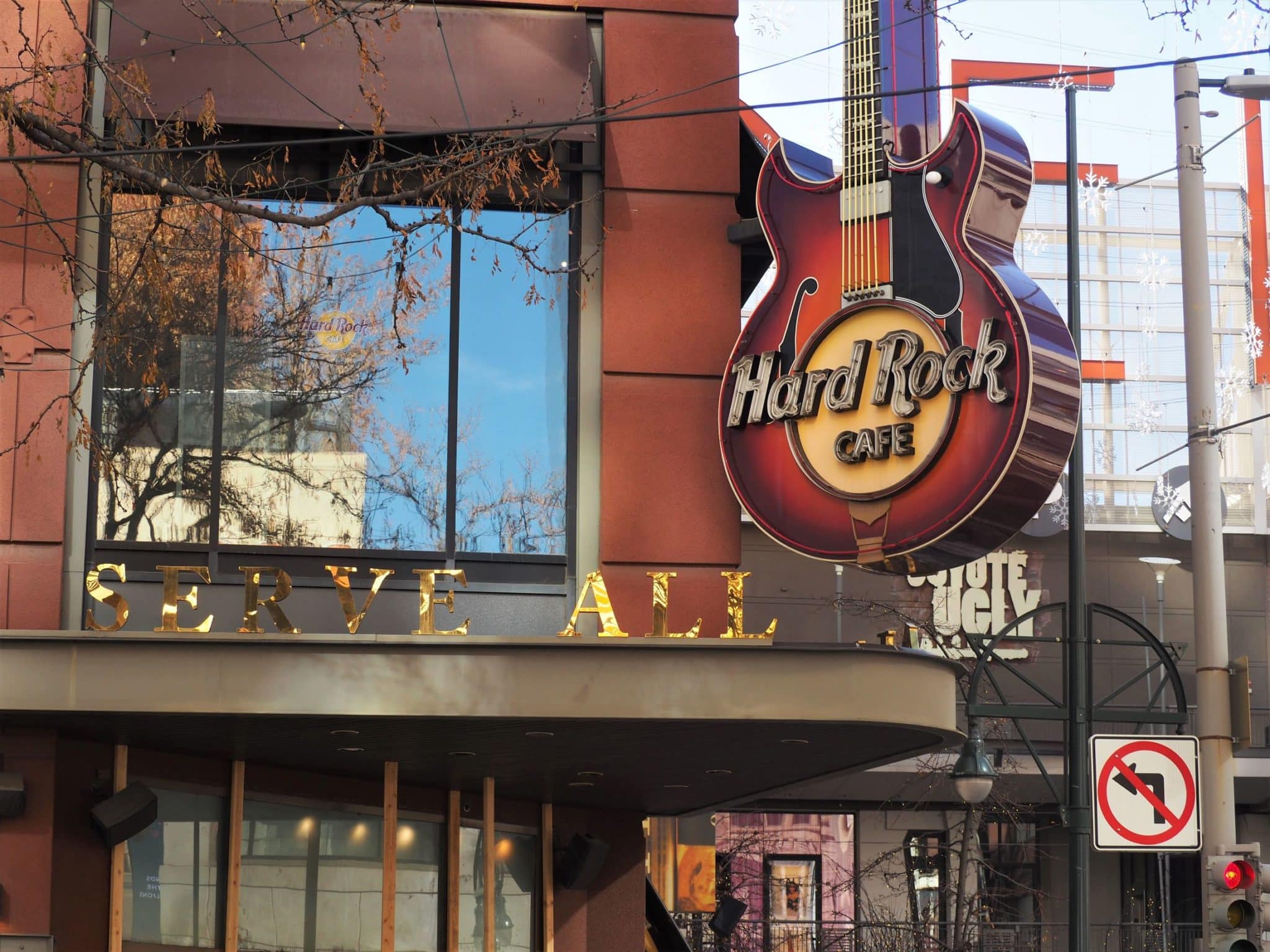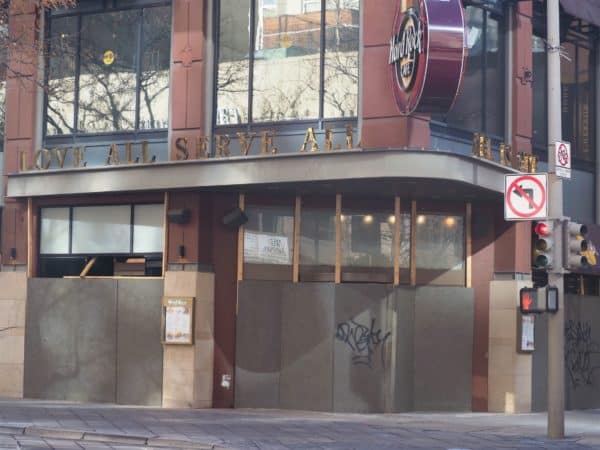
The Hard Rock Cafe at the corner of Glenarm Place and the 16th Street Mall in downtown Denver has been closed since mid-March. (Thomas Gounley photos)
The tunes have been on hold for nearly 11 months.
And after 25 years, sometime in March could be the day the music dies for Hard Rock Cafe’s location in downtown Denver.
The Florida-based chain of rock n’ roll-themed restaurants last week sued its 16th Street Mall landlord, asking a judge to rule it will have the right to terminate its lease next month, when pandemic-related government restrictions on business hit the one-year mark.
Hard Rock operates in 11,736 square feet at 500 16th St. Mall, within the Denver Pavilions mall. It has leased the space since 1996, according to the lawsuit.
The mall is owned by Denver Pavilions OwnerCo LLC, an entity made up of Denver-based Gart Properties and MetLife Real Estate Investors. Mark Sidell, president of Gart Properties, did not respond to a request for comment Friday.
According to its lawsuit, Hard Rock’s lease requires the Denver restaurant to operate 363 days a year, with only Thanksgiving and Christmas Day excepted.
But the chain’s only location in Colorado has not operated since mid-March, when restrictions forced restaurants to offer only takeout and delivery for weeks. Since then, restaurants have generally been allowed to operate at reduced capacity. The hours during which alcohol can be sold have also fluctuated.
Restaurants along the 16th Street Mall have been among the most challenged by the pandemic fallout. Many office workers have been staying home. Theater performances and sporting events that would typically draw thousands aren’t happening. Tourism is down, and the convention center was turned into a makeshift hospital, although never used.
Hard Rock says in its lawsuit that it paid rent in full for March, but hasn’t paid since.
“At all times since mid-March 2020, Tenant’s use of the Demised Premises has been materially and at times completely impaired, and otherwise rendered impracticable, by the Governmental Restrictions,” the lawsuit reads.
It’s not just the pandemic. Hard Rock also notes nearby properties were vandalized last spring and summer by “individuals exploiting opportunities presented by otherwise peaceful protests.”
Hard Rock says its landlord’s position is that Hard Rock is still obligated to operate at the location, and that it is not entitled to any rent abatement.
In the lawsuit, Hard Rock points to a provision of its lease that states “if Tenant’s use of more than twenty percent (20%) of the Demised Premises is materially impaired by reason of Force Majeure” for 30 days or more, the tenant is entitled to rent abatement. If the situation continues for more than one year, the tenant “shall be entitled to terminate this lease,” it states.
Hard Rock argues that condition is currently being met, and will hit the one-year mark in mid-March.
Hard Rock also alleges in the lawsuit that it was charged too much for its share of mall common area operating expenses from 2015 to 2019, and is entitled to a refund.
Attorney David Hutchinson of Denver’s Otten, Johnson, Robinson, Neff & Ragonetti is representing Hard Rock in the litigation. He declined to comment.

The Hard Rock Cafe at the corner of Glenarm Place and the 16th Street Mall in downtown Denver has been closed since mid-March. (Thomas Gounley photos)
The tunes have been on hold for nearly 11 months.
And after 25 years, sometime in March could be the day the music dies for Hard Rock Cafe’s location in downtown Denver.
The Florida-based chain of rock n’ roll-themed restaurants last week sued its 16th Street Mall landlord, asking a judge to rule it will have the right to terminate its lease next month, when pandemic-related government restrictions on business hit the one-year mark.
Hard Rock operates in 11,736 square feet at 500 16th St. Mall, within the Denver Pavilions mall. It has leased the space since 1996, according to the lawsuit.
The mall is owned by Denver Pavilions OwnerCo LLC, an entity made up of Denver-based Gart Properties and MetLife Real Estate Investors. Mark Sidell, president of Gart Properties, did not respond to a request for comment Friday.
According to its lawsuit, Hard Rock’s lease requires the Denver restaurant to operate 363 days a year, with only Thanksgiving and Christmas Day excepted.
But the chain’s only location in Colorado has not operated since mid-March, when restrictions forced restaurants to offer only takeout and delivery for weeks. Since then, restaurants have generally been allowed to operate at reduced capacity. The hours during which alcohol can be sold have also fluctuated.
Restaurants along the 16th Street Mall have been among the most challenged by the pandemic fallout. Many office workers have been staying home. Theater performances and sporting events that would typically draw thousands aren’t happening. Tourism is down, and the convention center was turned into a makeshift hospital, although never used.
Hard Rock says in its lawsuit that it paid rent in full for March, but hasn’t paid since.
“At all times since mid-March 2020, Tenant’s use of the Demised Premises has been materially and at times completely impaired, and otherwise rendered impracticable, by the Governmental Restrictions,” the lawsuit reads.
It’s not just the pandemic. Hard Rock also notes nearby properties were vandalized last spring and summer by “individuals exploiting opportunities presented by otherwise peaceful protests.”
Hard Rock says its landlord’s position is that Hard Rock is still obligated to operate at the location, and that it is not entitled to any rent abatement.
In the lawsuit, Hard Rock points to a provision of its lease that states “if Tenant’s use of more than twenty percent (20%) of the Demised Premises is materially impaired by reason of Force Majeure” for 30 days or more, the tenant is entitled to rent abatement. If the situation continues for more than one year, the tenant “shall be entitled to terminate this lease,” it states.
Hard Rock argues that condition is currently being met, and will hit the one-year mark in mid-March.
Hard Rock also alleges in the lawsuit that it was charged too much for its share of mall common area operating expenses from 2015 to 2019, and is entitled to a refund.
Attorney David Hutchinson of Denver’s Otten, Johnson, Robinson, Neff & Ragonetti is representing Hard Rock in the litigation. He declined to comment.


Leave a Reply